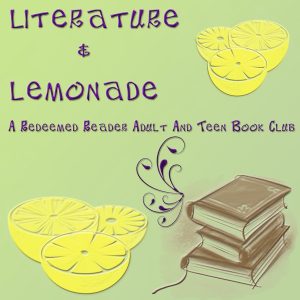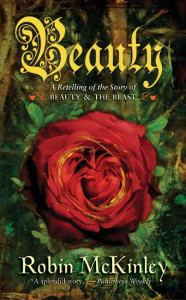Other Lemonade and Lit posts: Introduction, Week One: Booked, Week Two: Booked Discussion, Week Three: Beauty, Week Four: Sexuality in Booked, Week Five: Beauty Discussion, Week Six: The Last Thing I Remember, Week Seven: Klavan Discussion.
Lemonade and Lit:
An Adult-Teen Read Along, Week 3
 This post is a little late due to some internet problems I’ve had this weekend (sorry!), but I’m still happy to be able to post Gina Dalfonzo’s introduction to our second book of our summer Adult-Teen Read Along. I hope you guys will forgive me if I postpone our lemonade recipe until next weekend. Otherwise, Enjoy!
This post is a little late due to some internet problems I’ve had this weekend (sorry!), but I’m still happy to be able to post Gina Dalfonzo’s introduction to our second book of our summer Adult-Teen Read Along. I hope you guys will forgive me if I postpone our lemonade recipe until next weekend. Otherwise, Enjoy!
Beauty: A Retelling of the Story of Beauty and the Beast by Robin McKinley.
Robin McKinley is a popular and award-winning fantasy author. Beauty: A Retelling of the Story of Beauty & the Beast was her first novel, published in 1978. It also happens to be one of my favorite novels. McKinley skillfully weaves new and fresh elements into an old and beloved story.
That story has been retold over and over again, in literature, theater, movies, and TV. Just in recent years, it’s been made into a TV series on the CW; adapted by Christian YA novelist Melanie Dickerson (The Merchant’s Daughter); and used as a storyline on ABC’s Once Upon a Time. It’s also reflected in a host of other stories, such as The Phantom of the Opera, The Nutcracker, Cyrano de Bergerac, and The Hunchback of Notre Dame.
 Clearly, there’s something about the idea of the beautiful girl and the ugly beast that strikes a chord in our imaginations. Perhaps in a world too often distracted by appearances, this story in which appearances truly don’t matter gives us all a little hope.
Clearly, there’s something about the idea of the beautiful girl and the ugly beast that strikes a chord in our imaginations. Perhaps in a world too often distracted by appearances, this story in which appearances truly don’t matter gives us all a little hope.
The Discussion
1. Names play an important role in the story. McKinley uses them to simultaneously pay homage to the original fairytale, and to provide her own twist on it. What significance does the name “Beauty” end up having in this version?
2. This version of the story makes Beauty a voracious reader, much as the Disney film would do 13 years later. The story in Andrew Lang’s Blue Fairy Book also mentions that Beauty likes to read. Why might Beauty be presented as a book-loving heroine? What does this add to the story?
3. Most versions of the story portray Beauty’s sisters as selfish, greedy, and unkind. McKinley takes an entirely different route. Why do you think she might have done this, and how does that choice affect the story?
And be sure to leave us a few of your thoughts in the comments! We look forward to discussing the book after the 4th, and we’d love to include your comments or questions!
Stay Up to Date!
Get the information you need to make wise choices about books for your children and teens.
Our weekly newsletter includes our latest reviews, related links from around the web, a featured book list, book trivia, and more. We never sell your information. You may unsubscribe at any time.
Support our writers and help keep Redeemed Reader ad-free by joining the Redeemed Reader Fellowship.
Stay Up to Date!
Get the information you need to make wise choices about books for your children and teens.
Our weekly newsletter includes our latest reviews, related links from around the web, a featured book list, book trivia, and more. We never sell your information. You may unsubscribe at any time.
We'd love to hear from you!
Our comments are now limited to our members (both Silver and Golden Key). Members, you just need to log in with your normal log-in credentials!
Not a member yet? You can join the Silver Key ($2.99/month) for a free 2-week trial. Cancel at any time. Find out more about membership here.
6 Comments
Leave a Comment
You must be logged in to post a comment.

Even though I’m not really a fan of Robin McKinley’s writing style, I did enjoy this one. But am I the only one who feels that her stories are a little too slow and detail oriented? (I’ve read The Blue Sword, Beauty, Rose Daughter, Chalice, and Pegasus. Hated Pegasus, liked The Blue Sword the best. Now that I look at the list, it looks like a lot, but I just keep giving her another chance!)
Hi Anna — glad you enjoyed the book. Though I love it too, I agree with you that McKinley’s style can be uneven from book to book. Sometimes it’s great, and sometimes it can get completely bogged down in details and tangents. I’ll probably talk about this a little more on the upcoming podcast.
I’m a month behind but just finished Beauty today. How have I missed out on this gem for so long? Thank you for introducing me to a delightful take on the old story.
Beauty being a book lover helps her eventually see Beast for what he really is. Though it should have helped her see sooner! It allows Beauty and Beast to come to love one another as companions, because they can discuss so much.
I just reread Beauty and planned it into my daughters homeschool reading schedule for seventh grade. I read Rose Daughter as well to see which I liked better. I found that I didn’t like Rose Daughter at all. The writing was good—as in Beauty. But, it felt like she was following the way of much of YA fiction–weaving magic into everything. For me, the constant presence of magic detracted from the story. It reminded me of how our culture has subtlely twisted the way vampires are not portrayed (Mars Hill Audio Journal did a wonderful discussion of this if you’re interested.) https://www.thebrazosblog.com/2011/11/mars-hill-audio-interview-with-susannah-clements-and-book-excerpt/ In a similar way, magic, even dark magic, is very benignly portrayed now.
Thanks for the Mars Hill link, Anne. They often have thought-provoking topics! I’m not sure if YA lit has generally gone lighter, though it’s definitely true that the dark things like vampires are being called light. An interesting phenomenon for sure.